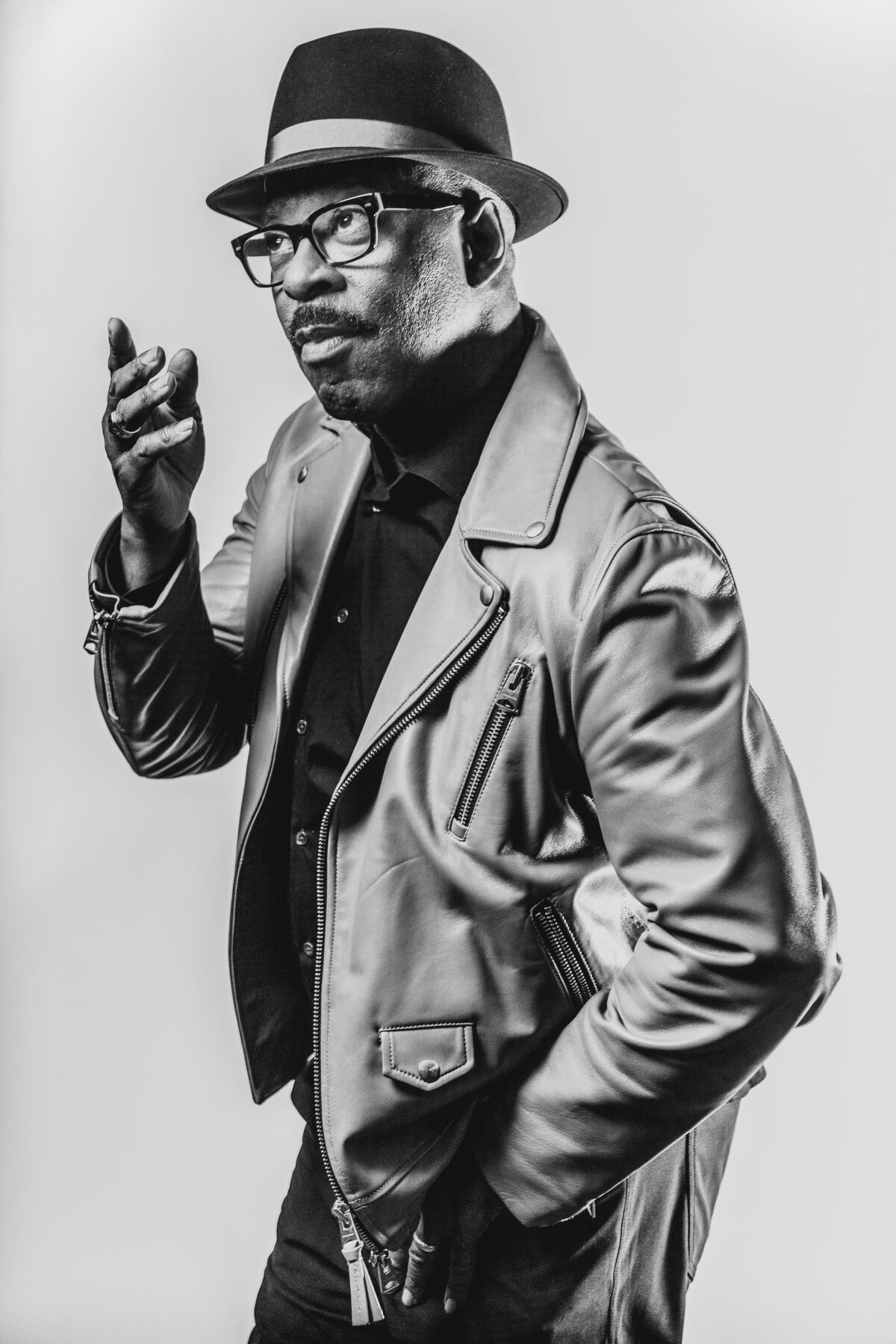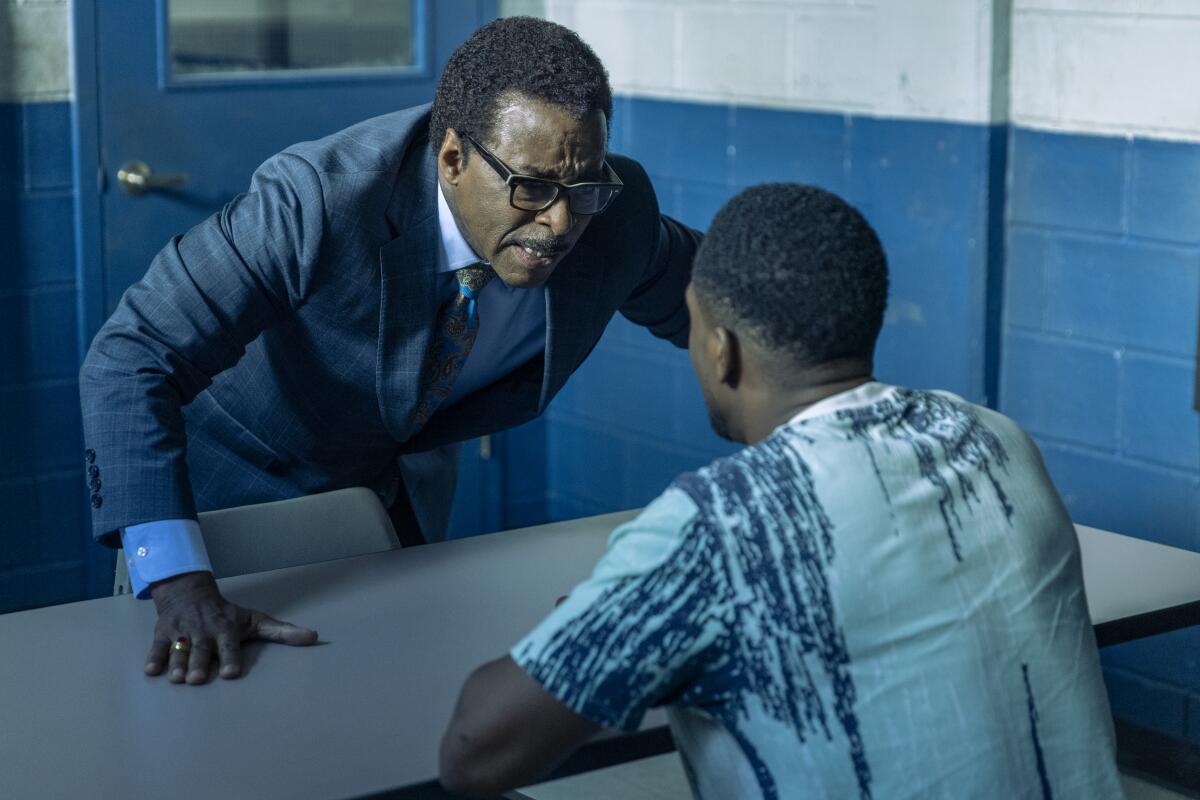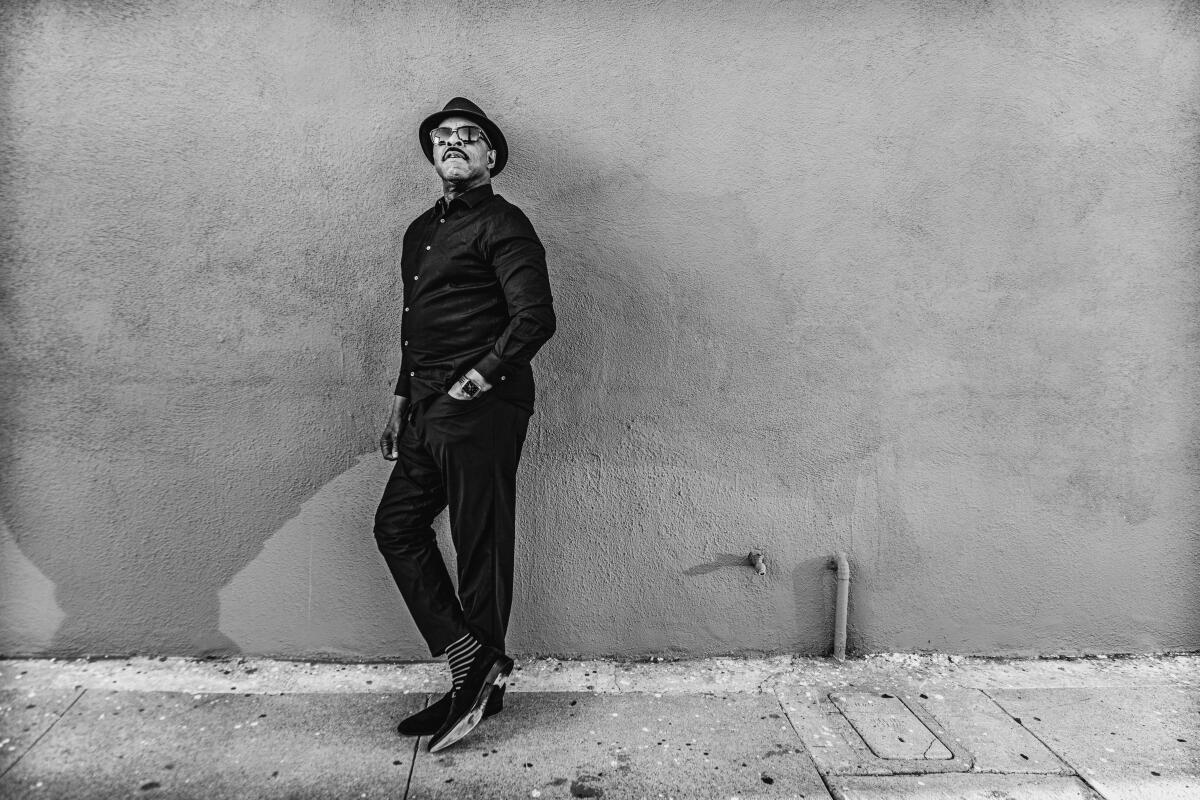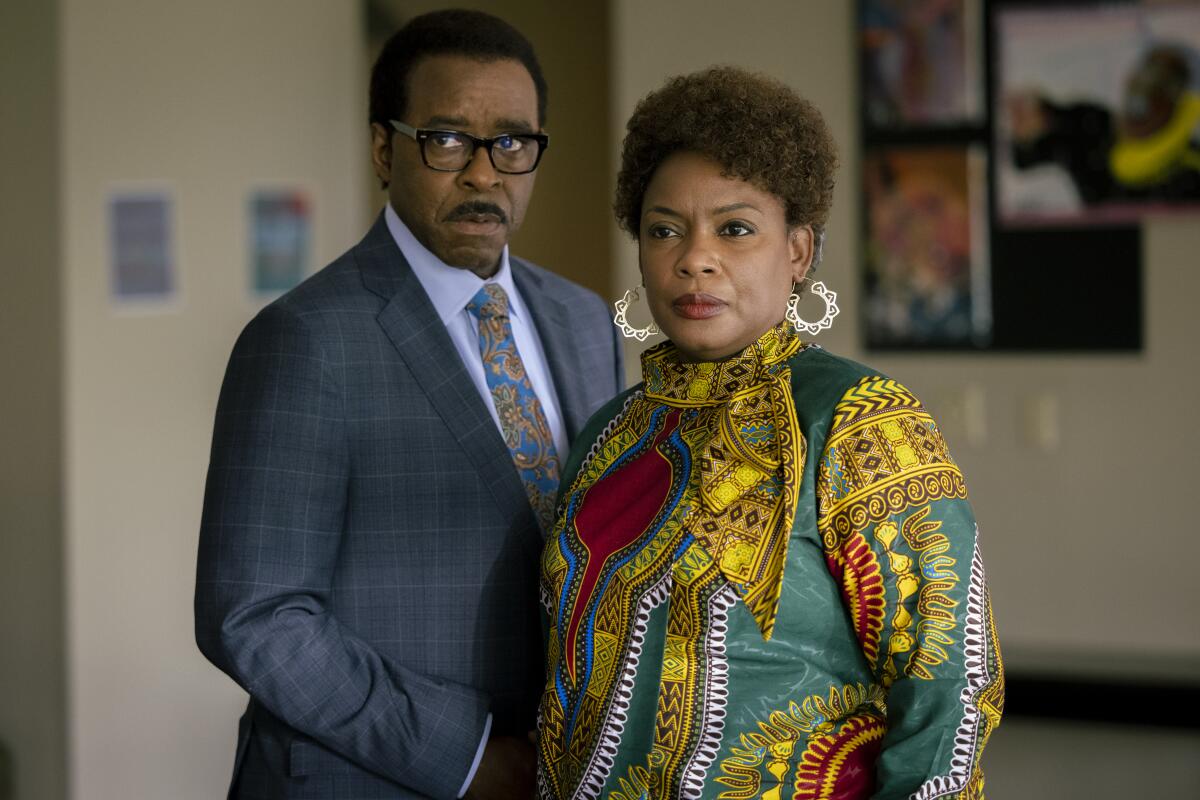The complete guide to home viewing
Get Screen Gab for everything about the TV shows and streaming movies everyone’s talking about.
You may occasionally receive promotional content from the Los Angeles Times.

Since his debut in the original Broadway productions of August Wilson’s “Fences” and John Guare’s “Six Degrees of Separation,” Courtney B. Vance has jumped between stage and screen, playing an extensive gallery of strong, vibrant characters in a career that has spanned almost four decades.
But while his Tony Award-winning role in 2013’s “Lucky Guy” and appearances in “The Hunt For Red October,” “Picket Fences,” “Law & Order: Criminal Intent,” “The Closer,” “The Preacher’s Wife,” “Isle of Dogs” and scores of other projects established Vance as a familiar presence to audiences, the breakout role that would display the full range of his craft remained elusive.
His defense of O.J. Simpson proved to be a game-changer.
Vance’s sly portrayal of Simpson’s cunning defense attorney Johnnie Cochran was a standout of FX’s “The People v. O.J. Simpson: American Crime Story,” scoring the actor an Emmy and opening the door to more prominent roles.
“Folks saw ‘O.J.’ and said, ‘Wow, this guy is an overnight sensation,’” Vance said with a slight chuckle during a recent Zoom interview. “So I said, ‘OK, I’ll take that.’”
Black viewers of HBO’s lauded drama series started a popular Facebook group to discuss it. They say its cancellation won’t slow them down.
His subsequent projects — including HBO’s “The Immortal Life of Henrietta Lacks” and NatGeo’s “Genius: Aretha” — won him more praise, and his guest role as a traveling guidebook author in HBO’s “Lovecraft Country” brought another Emmy.
The actor is now the lead in AMC’s “61st Street,” playing a veteran public defender just days from retirement who gets wrapped up in the charged case of a Black college-bound athlete accused of killing a white Chicago police detective. Already burdened with serious health and family issues, Vance’s character, Franklin Roberts, steps up to defend the young man — a decision that does not sit well with his activist wife, Martha (Aunjanue Ellis), and other members of the community.

Premiering Sunday, the drama, which lists Michael B. Jordan as an executive producer, is already generating buzz, winning an Audience Award at last month’s SXSW Film Festival. And it continues Vance’s streak of projects that grapple with the often-explosive subject matter of race and racism.
Said Vance: “I’m still trying to find projects that ask questions, are about provocative issues, that are fun to do and make a little money. My wife and I, we will literally sit there and say, ‘Is this worth doing?’ We will literally ask ourselves that question because sometimes it’s not clear.”
During the interview, Vance, who is married to actor Angela Bassett (“Black Panther,” “9-1-1”) spoke of the impact of “The People v. O.J. Simpson,” race in Hollywood and his memories of working with Whitney Houston, his “Preacher’s Wife” co-star.
You’ve always had a busy and steady career. But it seems like you’ve become even busier since your Emmy win for ‘The People v. O.J. Simpson.’
Vance: Things shifted after “O.J.” Prior to that, I still had to audition for everything. But after “O.J.” and coming up on being 60 years old, I said, “OK, I think I’ve earned a little right to at least have something presented to me.” The Emmy gave me that.
Were you surprised that series made such an impact?
Vance: There were people who thought “O.J.” would not do well because everyone knows what happened. We all saw the news coverage. But we hadn’t seen what happened in the bedroom between Johnnie and his wife as he was picking out his tie and she told him not to wear a purple tie because it made him look like a grape. That’s the kind of stuff people wanted to know.
We see at every turn that Johnnie is out-dueling Marcia Clark. She had no idea what she was entering into, and thought it was business as usual until it was too late. Those are the kinds of things that made the show bigger, bigger than the actual case. It took on a life of its own. We knew we had a great project, but did we know people would get behind it and make it the thing to see? Nobody knows that. The reception is not up to us.

How has it been after all the accolades, including winning two Emmys?
Vance: The recognition is wonderful. For the longest time, I didn’t know if people knew what I was doing. But I can’t let that get me down. I’m the same person when you want to know me as I am when you don’t want to know me. I have to focus on my life. I gotta get to the cleaners. I’ve got doctor’s appointments. The kids have got to get their braces.
‘61st Street’ is one of numerous TV dramas to look at race in the wake of the Black Lives Matter movement and the death of George Floyd and others. Looking at “O.J.,” “Lovecraft” and other projects you’ve been involved in, this issue appears to be of great importance to you.
Vance: These shows open up an opportunity to have a conversation. The tragedy is we avoid the conversations, and these situations keep coming up because we avoid them. There’s George Floyd. There’s Trayvon Martin. Just go down the list. And there’s going to be another one until somebody says, “These communities have to talk to each other.” There can’t be just two or three ways of dealing with people based on their skin color. It’s very painful. But slavery was painful. And it took a long time for us to come to the realization that we’re better off trying to work it out outside the institution than within it.
We don’t do anything in this country unless it’s an emergency, because we don’t want to change. It’s great to look at other countries and say, “Oh, they’re terrible. Look at what Russia is doing to the Ukraine.” But look at our history. We ain’t too pretty, either. We need to look at ourselves. We got some mess in this country. Always have.
Your character in “61st Street” is dealing with a lot of heavy issues, including prostate cancer, which makes taking on this case even more difficult.
Vance: It’s life. I’ve dealt with prostate issues. I didn’t have the cancer but had to have my prostate hollowed out. It was pressing on the urethra. The condition that is happening in the series where Franklin can’t urinate — that was real, my situation. Health is wealth. That’s the message. You have to go get checked. You have to get the colonoscopy, the mammogram. You have to get your teeth checked. You have to take care of the temple. I don’t want somebody coming up on me saying, “If you had just come here a little earlier.” That’s the whole fear of going to the doctor in the African American community.
Everything is happening to Franklin. It’s one sick man going against the system. But there are certain things bigger than all of us.

The series also reunites you with Aunjanue Ellis, who played your wife in “Lovecraft Country” and was nominated for an Oscar this year for “King Richard.” What’s it like working with her?
Vance: We’re the same. I love playing with her. She’s a consummate artist. She’s due. She’s overdue, just like Angela is overdue.
There’s been a lot of discussion recently about Whitney Houston, as the 10th anniversary of her death passed in February. You and Angela worked with her. What are your thoughts about Whitney?
Vance: It’s painful. It was painful to see someone who was so pure in terms of that voice. ... It’s all about how we feel about ourselves. If we don’t feel whole, it doesn’t matter what the image of ourselves is. We’re not going to survive unless we get some help. That was the struggle for Whitney, to find the help in time before she sabotaged herself. It can happen to any of us.
The complete guide to home viewing
Get Screen Gab for everything about the TV shows and streaming movies everyone’s talking about.
You may occasionally receive promotional content from the Los Angeles Times.